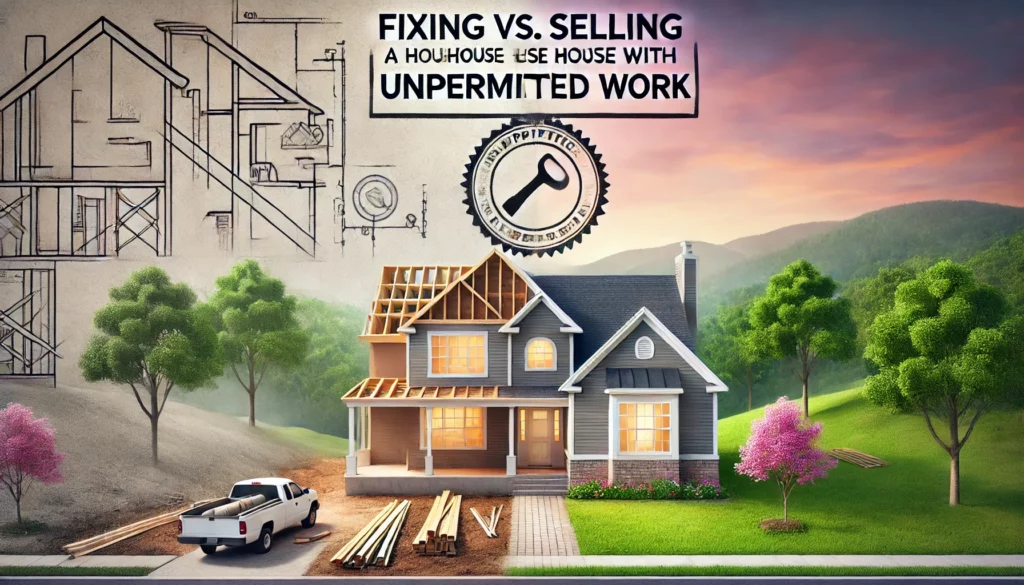Fixing vs. Selling a House With Unpermitted Work in Virginia

Introduction
If you’re searching for “Fixing vs. Selling a House with Unpermitted Work in Virginia,” it’s likely because you’re facing a challenge with a property that has renovations or improvements that weren’t approved through proper permits. You may be feeling overwhelmed or uncertain about the consequences of unpermitted work, especially if you’re looking to sell the house. You’re likely considering your options: whether to fix the issues and bring the house up to code, or to sell it as-is for cash. The idea of dealing with the costs and time delays of fixing these issues could be daunting. At the same time, you might have heard that selling to a cash buyer is quicker and might be more advantageous, but you’re unsure if it’s the best decision for you. In this blog, we’ll address the challenges of fixing unpermitted work, weigh the costs of doing so versus selling as-is for cash, and give you the insights you need to make the right choice.
What You Need to Know About Fixing vs. Selling a House With Unpermitted Work in Virginia
If you’re a homeowner in Virginia dealing with unpermitted work, you’ve likely run into a tricky situation. The renovations or improvements that you made to your property may have seemed like a good idea at the time, but now you’re discovering that they were never approved by the proper authorities. You may even be considering putting your home on the market, but you’re wondering: should you fix the unpermitted work or just sell the property as-is? Both options have their pros and cons, and it’s crucial to weigh these factors before making a decision.
In this post, we’ll explore both options in detail—fixing the unpermitted work or selling your house as-is for cash. We’ll discuss the potential risks, the financial costs, the timeline involved, and the impact on the sale price. By the end of this blog, you should have a clearer idea of which route to take and how to make the most out of your property, regardless of the situation.
What is Unpermitted Work, and Why Does It Matter?
Unpermitted work refers to any improvements or renovations made to a property without obtaining the necessary permits from local government authorities. These could include anything from adding a new room or finishing a basement to installing electrical systems or plumbing. The main issue with unpermitted work is that it violates local building codes and zoning laws, which are there to ensure that construction meets safety standards and is properly documented.
In Virginia, unpermitted work can have serious consequences. If you sell a property with unpermitted work, you may face challenges with the buyer’s inspection process. The buyer might require you to fix the issues before closing or ask for a price reduction, which can lower the sale value of your property. Additionally, you may be held responsible for the cost of bringing the house up to code. But before you start panicking about the potential problems, let’s explore the two main options: fixing the issues or selling the property as-is for cash.
Option 1: Fixing the Unpermitted Work – Pros and Cons
When faced with unpermitted work, the first option you might consider is fixing the issues. This involves obtaining the necessary permits, hiring contractors to make the required repairs, and getting the work approved by local inspectors. This approach could be beneficial in certain situations, but it comes with its own set of challenges.
Pros of Fixing the Unpermitted Work
- Increasing the Property’s Value
Fixing unpermitted work can potentially increase the value of your home. If the work was substantial, such as adding a new room or improving the kitchen, bringing the work up to code could make your home more marketable and appealing to a wider range of buyers. In Virginia, where housing inventory is competitive, a well-maintained home that complies with building codes might fetch a higher price. - Avoiding Future Liabilities
By fixing the issues, you’re taking the proactive step of addressing potential future liabilities. If a buyer purchases your house without knowing about the unpermitted work, they could eventually find out after the sale, leading to legal complications, costly repairs, or even fines. Fixing the issues upfront reduces the risk of this happening.
Cons of Fixing the Unpermitted Work
- High Costs
The cost of fixing unpermitted work can be significant. In Virginia, permitting fees, contractor charges, and the cost of materials can add up quickly. Additionally, you may need to make more extensive repairs than you originally anticipated to meet code requirements. For example, an electrical or plumbing issue could cost thousands of dollars to fix, which may not be worth the return on investment if you’re selling the property soon. HomeAdvisor provides helpful cost estimates for various home improvement projects, which can give you an idea of what to expect. - Time Delays
Permitting and inspections can take time. Depending on the scope of the work, you could be waiting several months for everything to be approved and completed. If you’re eager to sell your home quickly, this might not be a viable option. Many motivated sellers need to sell their properties fast—perhaps due to financial issues, relocation, or other personal matters. In these cases, waiting for repairs and permits could delay your sale significantly. Learn more about how long permits take on Virginia’s local building codes. - Uncertainty of Return on Investment
Even after spending money and time on fixing the issues, there’s no guarantee that you’ll recover your investment through the sale price. The local real estate market may not be favorable, and you may not be able to sell the home for a higher price, especially if the renovations weren’t substantial enough to justify the expenses. You could end up spending more money than you gain from the sale.
Should You Fix It?
If you have the time, resources, and budget to handle the repairs, fixing the unpermitted work could be a good choice. However, if you’re looking to sell quickly or if the repairs are extensive and costly, this might not be the best option. You might want to explore selling for cash instead. For a better understanding of how you can sell your home for cash with unpermitted work, check out our page on How to Sell a House With Unpermitted Work For Cash.
Option 2: Selling As-Is for Cash – Pros and Cons
The second option is to sell your house as-is to a cash buyer. This route eliminates the need for repairs, permits, or inspections and offers a fast and efficient way to sell. Let’s break down the pros and cons of selling as-is for cash.
Pros of Selling As-Is for Cash
- Speed of Sale
One of the biggest advantages of selling to a cash buyer is the speed. The transaction typically closes in as little as seven to fourteen days. If you’re facing financial pressure or need to sell quickly due to a life event, selling as-is allows you to avoid the lengthy process of fixing unpermitted work and waiting for inspections. - No Repair Costs
When you sell to a cash buyer, there’s no need to spend money on fixing the unpermitted work. Cash buyers purchase properties in any condition, and they are willing to take on the responsibility of dealing with the work themselves. This saves you the hassle of paying for repairs or hiring contractors. - Avoiding Potential Buyer Back-Outs
If you sell a property with unpermitted work through a traditional sale, the buyer’s inspector might flag the issues, and the buyer could back out or demand price reductions. Cash buyers are often more flexible and less likely to walk away from a deal. They understand that unpermitted work is a common issue, and they are typically less concerned about it.
Cons of Selling As-Is for Cash
- Lower Sale Price
Cash buyers usually offer less than traditional buyers would, as they take on the risk of purchasing a property with unpermitted work. While you’re selling quickly and without the hassle of repairs, the offer you receive will likely be lower than what you would get from a buyer willing to wait for the property to be brought up to code. - Limited Buyer Pool
While selling as-is for cash is fast, it limits your potential buyers. Many buyers prefer homes that are in good condition and will meet code requirements. Cash buyers, on the other hand, are typically investors or companies that specialize in buying houses in any condition, so they may not be as focused on obtaining the highest resale value.
Should You Sell for Cash?
If you’re facing time constraints or don’t have the financial resources to fix the unpermitted work, selling as-is for cash could be the best option. It’s fast, hassle-free, and allows you to move on with your life without the burden of costly repairs. Additionally, if you’re also dealing with other code violations, such as issues related to the home’s structure or electrical systems, selling quickly could be the best route. Learn more in our page on How to Sell a House with Code Violations.
Conclusion: What’s the Best Option for You?
When deciding between fixing unpermitted work or selling for cash, there are many factors to consider, including cost, time, and the potential return on investment. If you have the time and resources to handle the repairs and believe that fixing the issues will increase the sale price, it might make sense to invest in bringing your home up to code. However, if you need to sell quickly and don’t want to deal with the hassle and expense of repairs, selling as-is for cash could be a more practical solution.
At Sold First, we specialize in purchasing homes with unpermitted work, offering a hassle-free, quick, and fair cash sale. If you’re facing the challenge of selling a house with unpermitted work, we can help you avoid the stress of repairs and inspections, providing you with a fast and reliable solution. Contact us today for a free, no-obligation cash offer and let us make the selling process simple and straightforward. Whether you decide to fix your property or sell as-is, we’re here to guide you every step of the way.

